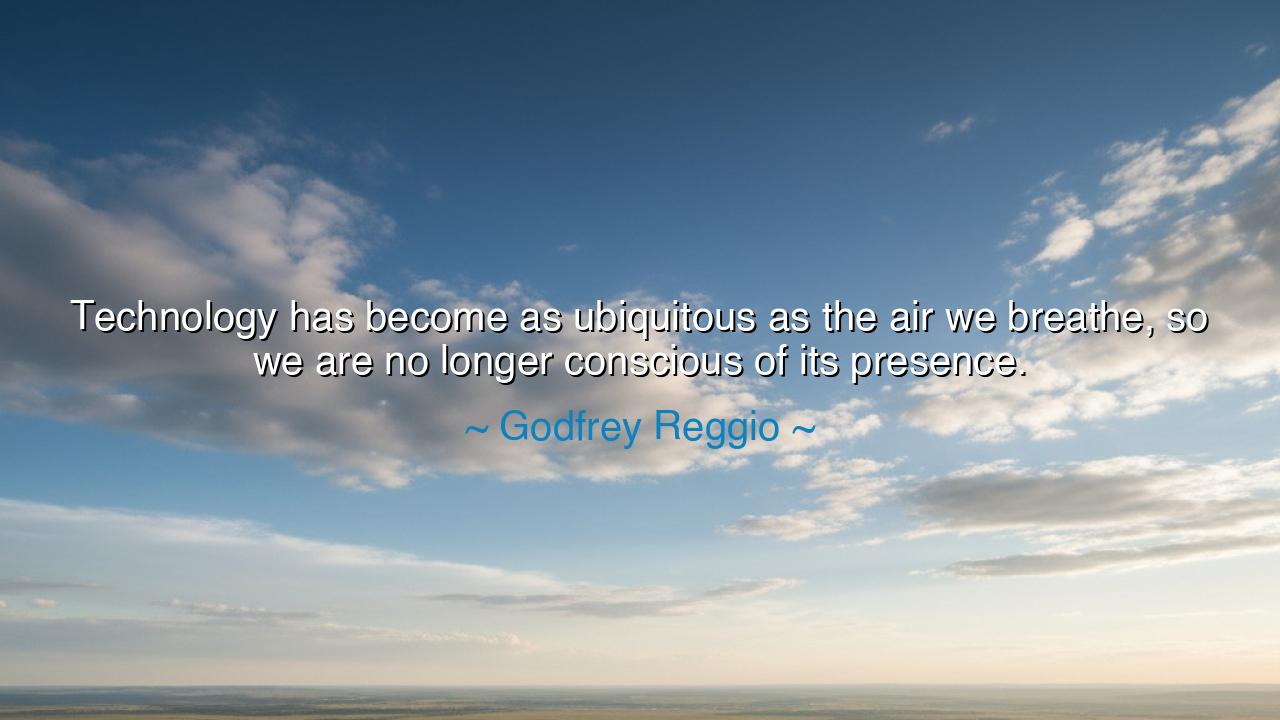
Technology has become as ubiquitous as the air we breathe, so we
Technology has become as ubiquitous as the air we breathe, so we are no longer conscious of its presence.






Hear the words of Godfrey Reggio, who proclaimed: “Technology has become as ubiquitous as the air we breathe, so we are no longer conscious of its presence.” This statement, though born of the modern age, resounds like an ancient oracle. It reminds us that what is ever-present becomes invisible, and what is invisible often shapes us most of all. Just as fish do not notice the waters in which they swim, so do we fail to see the vast ocean of machines, systems, and devices that enfolds our lives.
When Reggio speaks of technology as air, he names it as both sustainer and silent master. The air gives us life, yet we seldom honor it until it is poisoned or taken away. In the same way, technology nourishes our days—it brings us food, heals our wounds, carries our voices across the earth—yet we seldom pause to recognize its power. To be unconscious of such a force is both a marvel and a danger: a marvel, for it shows how seamlessly invention has been woven into our existence; a danger, for it blinds us to how deeply we depend upon it.
The ancients, too, knew of this blindness. The citizens of Rome lived in awe of their aqueducts and roads at first, yet soon came to take them for granted, never imagining life without them. When the empire fell and those waters ceased to flow, generations learned by thirst what their ancestors had forgotten by habit. Thus, the lesson is timeless: to ignore the pillars that sustain life is to invite collapse when those pillars tremble.
Consider, too, the story of the printing press in the fifteenth century. At first, its arrival shook the world like thunder. Kings, priests, and scholars feared or rejoiced at its power. But within a few generations, the book became commonplace, and its presence was as unnoticed as the stones of the marketplace. Yet it continued to shape minds, revolutions, and faiths. Such is the nature of every technology—it is loud at its birth, but soon becomes a silent architect of destiny.
Reggio’s words call us to awaken. To be unconscious of technology is to surrender our freedom, for what we do not see, we cannot question, and what we cannot question, rules us without resistance. If we are not mindful, then the very tools we shaped shall shape us, molding our thoughts, our desires, and even our sense of what it means to be human. Awareness is our only safeguard; mindfulness, our only shield.
The meaning is thus: we must strive to look with fresh eyes upon the air we breathe. To notice the phone in our hand, the engine in our streets, the code in our machines, is to reclaim power over them. To ask, “How do these tools serve me? How do they change me?” is to step out of unconscious servitude and into conscious mastery. For technology is a servant only as long as we remain awake; it becomes a tyrant when we sleep.
Therefore, beloved listener, let this teaching be your guide. Each day, pause to recognize the technology around you. Honor it as you honor the air: breathe it with gratitude, but do not forget its weight upon your life. Ask yourself what you might become if it vanished, and ensure that your soul remains strong even without it. Use it wisely, but do not be used by it. In this way, you may live not as a fish blind to water, but as a master who sails the seas with open eyes.
Thus speaks the wisdom of Reggio: technology is the unseen air of our age. If we remain unconscious, it shall shape us without mercy. But if we awaken, we may guide it toward a future where humanity does not drown, but soars on wings of its own making. Be mindful, be vigilant, and breathe with awareness.






AAdministratorAdministrator
Welcome, honored guests. Please leave a comment, we will respond soon